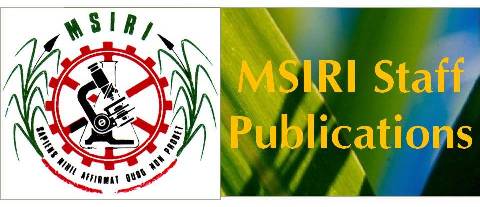Enhanced reproductive output of native trees following removal of invasive alien plants in a tropical forest in Mauritius
| MSI11P4580 | |
| Monty, M L F Baider, C Florens, F B V | |
| Enhanced reproductive output of native trees following removal of invasive alien plants in a tropical forest in Mauritius | |
| [Programme and Abstracts] - Adaptability to climate change and attaining the Millennium Development Goals for tropical ecosystems. The 2011 Joint International Meeting of the Association of Tropical Biology and Conservation and the Society for Conservation Biology (Africa Section), Narua Spring Hotel. Arusha, Tanzania, 12-16 June 2011 | |
| The 2011 Joint International Meeting of the Association of Tropical Biology and Conservation and the Society for Conservation Biology (Africa Section) "Adaptability to climate change and attaining the Millennium Development Goals for tropical ecosystems", Narua Spring Hotel. Arusha, Tanzania, 12-16 June 2011 | |
| book chapter | |
| 2011 | |
| p. 47 | |
| Abstract only | |
| En | |
| Invasive alien species pose serious threats to biodiversity, especially in oceanic islands where high rates of both endemism and extinction risk also usually prevail. Alien plants invasions in particular are often extreme on those islands. However, the extent to which such plant invasions have negatively impacted native plants is debated and rigorously demonstrated detrimental effects of invasive alien plants (IAP) on native plants are scarce. Documented plant species decline and extinction have indeed often coincided as much with habitat destruction or other threats, as with the invasion of alien species themselves. Furthermore, different alien species (plants, animals, etc.) commonly deliver different simultaneous impacts like predation, disease or competition. In such situations, assessing the impact of plant invasion on the flora can be difficult, but is desirable to optimise managers' resources. One approach to probe the potential of IAP in impacting native plants is to carry out controlled experiments where IAP are removed from the habitats they invade and the subsequent changes compared with invaded areas. We sampled seedling plots and monitored the reproductive output of 20-40 individuals of nine selected native species from different forest strata in both weeded and adjacent non-weeded areas in the wet lowland forest of the tropical island of Mauritius through direct count/estimation of the number of buds, flowers and fruits produced. Reproductive output is greater in the weeded areas with the largest improvement noted for the smallest species studied, possibly due to their small sizes exposing them to greater competitive interactions with alien plants in the alien-infested forest. Diversity of native seedlings was also much higher in weeded areas. The study stresses the importance of weeding in stemming decline of the native flora and in helping to restore ecological interactions like frugivory and seed dissemination. | |
| tropical island tropical oceanic island forests wet forests endemic plants weeding flora invasive plants invasive alien plants | |
| Mauritius | |
| Flora | |
| 2011-09-14 | |
| En | |
| LIB(pdf); HERB | |
| CAT | |
| HERB |
